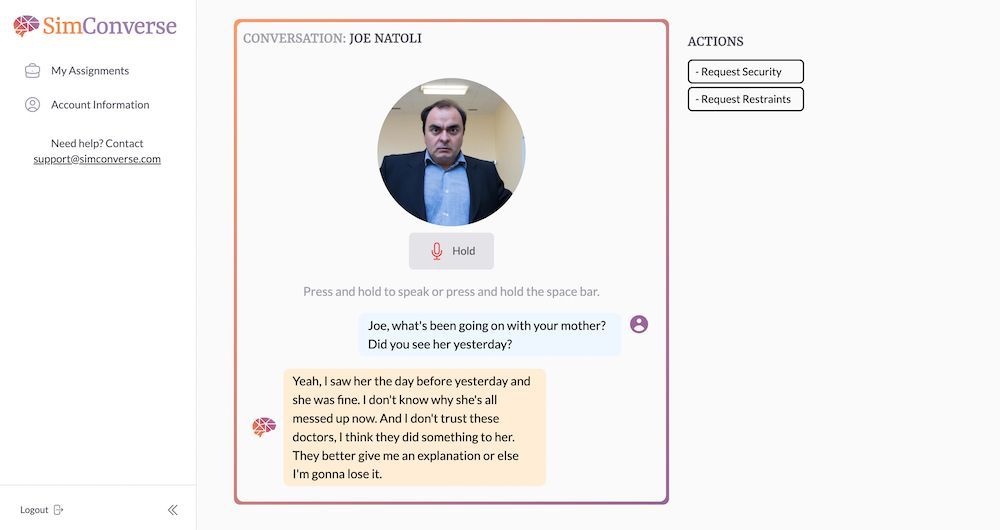Optometry programs across the US are faced with an urgent problem following the introduction of a new board exam component that tests communication skills. SimConverse AI is already being used as a viable solution nationally. In-line with a trend spanning nursing, medicine and allied health, the National Board of Examiners in Optometry (NBEO) has moved to introduce an OSCE-style licensure exam component. Nurses reading along will still recall the dramatic change of Next-Gen NCLEX & Doctors are bracing, preparing for the re-introduction of STEP 2 CK. This HealthySimulation.com article will highlight the results of optometry’s success with SimConverse utilization.
Optometry
Starting in 2024 with the PEPS Part III exam, Optometry students are expected to demonstrate competence not just in their physical ability to perform the skills of an Optometrist, but in their cognitive skills. For the first time, students will also be examined on their communication skills, patient manner and clinical reasoning.
This is a radical shift, and Optometry programs are scrambling to ensure they can provide sufficient focused preparation for their students. Thankfully, this is not hard to figure out what is needed; there is only one way to prepare for these exams: focused and repeated practice in interactive clinical scenarios. The only problem is that freely available OSCE-style simulation with human actors is extremely resource-intensive for programs to deliver.
Leaders from Midwestern University’s Optometry program reacted quickly and reached out to SimConverse in 2023 following NBEO’s announcement. They had heard about successful deployments of SimConverse in pharmacy, allied health, nursing, and medicine but wanted to know if the company had anything to offer for an Optometry program.
SimConverse: The Answer for Optometry
SimConverse has several advantages that make them uniquely well-suited for communication and clinical reasoning training in allied health and optometry environments. For one, SimConverse is very simple, making for easy and rapid rollout across an already established curriculum. They are able to set up and roll out to over 1000 learners at the touch of a few buttons.
SimConverse does not use any VR hardware, which significantly decreases the upfront investment required to get started. For most Allied Health programs, needing to purchase a set of VR headsets and take on the ongoing burden of maintenance and upgrades is a complete non-starter.
The core loop for students is a free-flowing verbal conversation with an AI character delivered through a web browser. This is accessible to students on their phones, tablets, or laptops. Once that conversation is completed, students get immediate rich and detailed feedback on precisely how they performed against a standardised and consistent rubric.
Further simplifying implementation, the platform is the most comprehensive AI simulation software available. SimConverse can deliver didactic content, enable learners to perform and see the results of clinical investigations (which is critical for procedurally-heavy environments such as Optometry) and facilitate reflections. Educators are able to set the platform and SimConverse perform the entire delivery of a simulated scenario.
Optometry programs are not going to be completely retiring their simulation teams any time soon. The platform does not simulate the physical use of Optical Equipment, which they say is done more cheaply and efficiently using existing methods.
Aiden Roberts, CEO of SimConverse said “We built SimConverse to give healthcare disciplines like Optometry exactly what they need, and nothing that they don’t need […] Optometry programs are already great at teaching the physical skills, and they’re great at teaching the theory of communication & clinical reasoning. What they don’t have, are the resources to provide the kind of simulated practice volume & flexibility that SimConverse can using our AI platform.”.
The final piece of the SimConverse platform is perhaps the most unique, in a marketplace where simulationists are familiar with purchasing fixed and narrow libraries of scenarios, SimConverse offers a large library out of the box and the ability to completely customise every aspect of the platform. Simulated characters can be easily authored, either from scratch or by modifying one of the 100s of templates supplied. Standardised rubrics can be assembled either by dragging and dropping from a pre-set library of learning outcomes, or authoring your own.
When I asked the COO of SimConverse, William Pamment, about this unique strategy stated “No simulationist wants to use a cookie cutter scenario, the challenge is in building a technology that is flexible enough to support creativity. There’s an operational challenge as well in ensuring the library is comprehensive enough out of the box to ensure educators are mostly customising from existing content, instead of needing to author from scratch. We’re built to save educators time and make things easier, everything we do is focused around that.”
Because of this flexibility, SimConverse, which launched in 2020, was able to quickly move past supporting common scenarios in Nursing and Medicine, into more niche sub-disciplines and Allied Health disciplines as well. Their typical customers are Universities or Hospitals that use them in training for two or more health disciplines.

Results
The Midwestern team customised and launched 48 scenarios in their first three months, all tailored to the NBEO Part III Boards Examination. An incredible pace of deployment for such a diverse set of scenarios, made possible in part thanks to technologies ease of use and authoring support.
The education team asked all students the following five questions on a 10-point Likert Scale adapted from the principles of the SET-M Simulation Effectiveness Tool with two questions about SimConverse:
- I found this more engaging than lectures & textbooks
- I found the simulated environment a safe space to practice difficult or courageous conversations.
- I soon felt comfortable communicating with the AI character(s).
- The feedback from the grading rubric was valuable for identifying where improvements could be made.
- I feel confident that if I encounter this scenario in the future, I’ll know how to handle it.
- I would like to use SimConverse for other parts of my learning as well
- I would recommend other learners use SimConverse
They received astonishing results from a large sample of 367 learner responses:
- 91.8% Found SimConverse more engaging than their passive content
- 91.6% Found SimConverse was a safe space for their conversations
- 88.0% Felt comfortable leveraging the platform and it’s AI
- 90.7% Found the feedback the platform provides was valuable
- 90.2% Felt the platform improved their confidence for future professional practice
- 85.6% Would like to have used the platform in other parts of their learning
- 88.0% Would recommend the platform is used by other learners
On the results, the deployment and their future plans, Alicia Feis, OD, Dean of the Arizona College of Optometry at Midwestern University said, “Students clearly love using SimConverse for boards preparation, and it provides an alternative resource in a flexible learning environment to test their skills and knowledge. It also stimulates the college to think about delivery of clinical skills in a modern way while providing more immediate real-time feedback to students about their progress. We are excited about continuing our investment into the SimConverse platform and plan to integrate it into other parts of our four-year curriculum too.”
The final proof will be in the results of the first cohort of students to go through boards this year. Though with enthusiastic adoption by students and staff and a view for the future of education firmly including AI, Midwestern University is continuing the use of SimConverse through 2025 and beyond.
View the HealthySimulation.com Webinar Leverage AI for Large Scale Healthcare Communication Skills Training to learn more!
More About SimConverse
SimConverse was founded in 2020 by CEO Aiden Roberts and COO Will Pamment. The founders conceptualized the company while studying medicine when they realized that healthcare curricula lack emphasis on communication skills and instead focused on procedural and clinical skills only. Given that the majority of medical errors come from ineffective communication, the duo knew they were uniquely able to tackle this problem. Coupling Aiden’s decade worth of experience in AI and Will’s ongoing research into clinical education theory, SimConverse was born.







